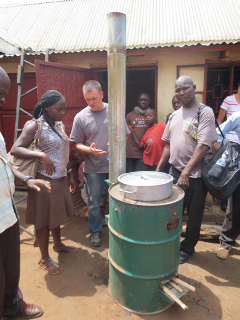For centuries, maybe even millennia, African women have prepared meals by setting a cooking pot on three stones and shoving tree limbs underneath for fuel. Despite its long tradition, this method is expensive, inefficient, and unhealthy. Too many trees are coming down, most of the heat escapes, and all kinds of eye irritation and respiratory ailments crop up due to the smoke.
As a response, this community was introduced to a carefully designed rocket stove which uses very little fuel, significantly reduces emissions, and is quite efficient. Two institutional-size (60-liters) stoves currently await installation in our new Christ Community Lutheran School in Kawete, Uganda kitchen which is under construction. These will use fuel bricks or small sticks and twigs.
And what's more, we now have a fuel brick press thanks to a volunteer from Missouri who engineered it for us! Fuel cakes can be made from almost any biomass: dried leaves and garden waste, sawdust, waste paper, even animal dung. Two of the presses are currently in use: one in Wakiso District (where the cakes are made of charcoal dust and cassava paste) and one at CCLS-U (where shredded paper, sawdust, clay, and water are used).

